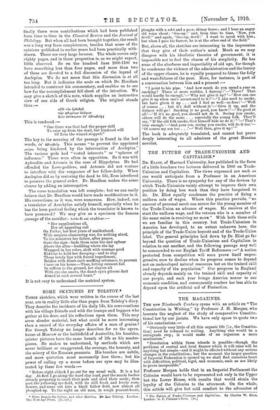SOME SKETCHES BY TOLSTOY.*
THESE sketches, which were written in the course of the last year, are in reality little else than pages from Tolstoy's diary.
They describe the incidents of his daily life, his conversations with his village friends and with the tramps and beggars who gather at his door, and his reflections upon them. This may seem slender material, but what could be more interesting than a record of the everyday affairs of a man of genius ?
For though Tolstoy no longer describes for us the opera- house at Moscow or the battlefield of Austerlitz, his humbler, quieter pictures have the same breath of life as his master- pieces. He makes us understand, by methods which are never brilliant or exaggerated, the courage, the honesty, and the misery of the Russian peasants. His touches are subtle, and mere quotation must necessarily lose them ; but his power of calling up a scene before our eyes may be illus- trated by these few words :—
"Before eight o'clock I go out for my usual walk. It is a hot day. At first I go along the hard clay road, past the acacia bushes already preparing to crack their pods and shed their seeds ; then past the yellowing rye-field, with its still fresh and lovely corn- flowers and come out into a black fallow field, now almost all ploughed up. To the right an old man, in rough peasant-boots, • Three Dna in the Village, and other Sketches. 11.-Lco Tolstoy. London : The Free Ago Press: [1s. net.] ploughs with a mild and a poor, skinny horse; and I hear an angry old voice shout Gee-up ! ' and, from time to time, Now, you devil !' and again, 'Gee-up, devil!' I want to speak with him; but when I pass his furrow, he is at the other end of the field."
But, above all, the sketches are interesting in the impression that they give of their author's mind. Much as we may disagree with his idealistic theories of government, it is impossible not to feel the charm of his simplicity. He has some of the aloofness and impartiality of old age, for though he condemns the violence of the administration and the luxury of the upper classes, be is equally prepared to blame the folly and wastefulness of the poor. Here, for instance, is part of a conversation between him and a peasant :— " I point to his pipe. And how much do you spend a year on smoking? Three or more roubles, I daresay !'—' Three ? That would hardly be enough.'—' Why not give it up? How can one give it up when one's accustomed to it ?'—' I also used to smoke, but have given it up . . . and I feel so well—so free !'—' Well
of course . . . but it's dull without Give it up, and the dulness will go ! Smoking is no good, you know !'—' No good at If it's no good, you should not do it. Seeing you smoke, others will do the same . . . especially the young folk. They'll
say, "If the old folk smoke, God himself bids us do it !" That's true enough.'—'And your son, seeing you smoke, will do it too.'— 'Of course my son too . . .'—` Well then, give it up!"
The book is adequately translated, and cannot but prove deeply interesting to all admirers of the great Russian novelist.


































































 Previous page
Previous page